(完整版)新概念英语2课后选择题答案及详解
新概念英语第二册课后习题答案详解(整理打印版)
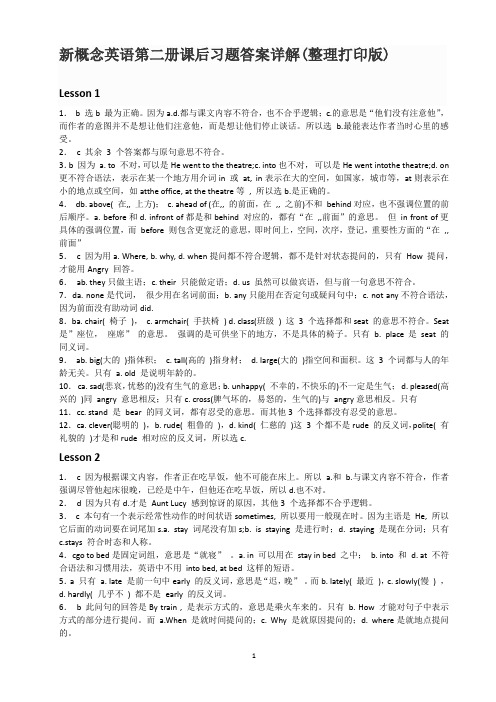
新概念英语第二册课后习题答案详解(整理打印版)Lesson 11.b 选b 最为正确。
因为a.d.都与课文内容不符合,也不合乎逻辑;c.的意思是“他们没有注意他”,而作者的意图并不是想让他们注意他,而是想让他们停止谈话。
所以选 b.最能表达作者当时心里的感受。
2.c 其余3 个答案都与原句意思不符合。
3.b 因为a. to 不对,可以是He went to the theatre;c. into也不对,可以是He went intothe theatre;d. on 更不符合语法,表示在某一个地方用介词in 或at, in表示在大的空间,如国家,城市等,at则表示在小的地点或空间,如atthe office, at the theatre等, 所以选b.是正确的。
4.db. above( 在,, 上方);c. ahead of (在,, 的前面,在,, 之前)不和behind对应,也不强调位置的前后顺序。
a. before和d. infront of都是和behind 对应的,都有“在,,前面”的意思。
但in front of更具体的强调位置,而before 则包含更宽泛的意思,即时间上,空间,次序,登记,重要性方面的“在,, 前面”5.c 因为用a. Where, b. why, d. when提问都不符合逻辑,都不是针对状态提问的,只有How 提问,才能用Angry 回答。
6.ab. they只做主语;c. their 只能做定语;d. us 虽然可以做宾语,但与前一句意思不符合。
7.da. none是代词,很少用在名词前面;b. any只能用在否定句或疑问句中;c. not any不符合语法,因为前面没有助动词did.8.ba. chair( 椅子),c. armchair( 手扶椅) d. class(班级) 这3 个选择都和seat 的意思不符合。
Seat 是”座位,座席”的意思。
强调的是可供坐下的地方,不是具体的椅子。
新概念英语第二册答案详解

新概念英语第二册答案详解每课的选择题:Lesson 1: bcbdc adbac ccLesson 2: cdcca bbadc dbLesson 3: cacac bccba bbLesson 4: dbabb acbca ccLesson 5: cadbc dabcb bdLesson 6: dacdd adaba daLesson 7: bccda cdacb abLesson 8: dbbac cbbad bbLesson 9: cbdaa bbdbb dcLesson 10: addcb cacac caLesson 11: bbbab ccacc bdLesson 12: ccadd adacd aaLesson : 13 bdbca bbcaa adLesson 14: bcacd bcbcb bbLesson 15: dbcbc dadcc cbLesson 16: aadab adadd daLesson 17: dbbdc cbaac adLesson18 : Bdbdb cdcac cbLesson 19: Adccd bcbca ccLesson 20: Bcbbc bcacc daLesson 21 : cdcda cbbad ccLesson 22: dbddb dacda bbLesson 23: aaacc addbb adLesson 24: baaca acccb abLesson 25: cbbab cdbaa daLesson 26: adcbc ddabd bdLesson 27: dcddd baddc ccLesson 28: cdbbc dbdcd baLesson 29: bccbd babbb cbLesson 30: aadab cccda ddLesson 31: dbaca adabc acLesson 32: cccbb cadad bcLesson 33: dbdac bbccc acLesson 34: dabca dcbcb caLesson 35: adadd adaba ddLesson 36: addcd ccbad ccLesson 37: cbbbb dacdb baLesson 38: bcaac bddba ddLesson 39: dacdd abacc abLesson 40: ccbca acbbb bdLesson 41: aacdc bbada cbLesson 42: dddbb cddac daLesson 43: bbaad daccd acLesson 44: cbccc bdaba bdLesson 45: bdabb dcbcb dbLesson 46: acdda cbcad caLesson 47: dabad aaddc ac Lesson 48: cbcba cbbda bc Lesson 49: dabab ccacc aa Lesson 50: dbacc aadbb cd Lesson 51: bcddd adcad db Lesson 52: bccab dcbac bd Lesson 53: cdacc cdcda cc Lesson 54: dbdbd badcb dd Lesson 55: aabda acabd ab Lesson 56: cacca cabbc cc Lesson 57: abbbb dcdcb da Lesson 58: bdaac bdcad bd Lesson 59: dbddd abada ab Lesson 60: bacbc babac ad Lesson 61: bacca dcabb dd Lesson 62: addcd ccbda db Lesson 63: dbaab ddacd ca Lesson 64: ccccb bccab bb Lesson 65: adbbc aadcc bd Lesson 66: cbaad aabab ba Lesson 67: daddd dbbad dd Lesson 68: bbcdb bbccc aa Lesson 69: abcbb ddaab cd Lesson 70: dbccd bcacd dc Lesson 71: bdbbc cdbbc ba Lesson 72: acadb accdb ad Lesson 73: cadac dadaa db Lesson 74: baccd cacbc ab Lesson 75: cabdb abbdd cc Lesson 76: dbdaa bbacb dd Lesson 77: acabc dddaa ba Lesson 78: acbbc acbab ca Lesson 79: bdcca dbada ac Lesson 80: cbdad cadcc db Lesson 81: daadb bdcbd bd Lesson 82: abadc cdaac bd Lesson 83: bacca bcbcd ab Lesson 84: ccabd cccda cd Lesson 85: ddbab abdbb dc Lesson 86: bcabb bdcab bc Lesson 87: cdcda ccada ad Lesson 88: cbbcc abbcc cb Lesson 89: aadad dadbd db Lesson 90: bccca bcbad dd Lesson 91: dbcbc dbbcb cb Lesson 92: bcdcb abbad ca Lesson 93: cdbac ccdcb db Lesson 94: abcba dacda bc Lesson 95: dabad cdcac dc Lesson 96: dccba dcdab cb这是课后习题的A private conversation私人谈话练习答案 Key to written exercises1.关键句型练习答案A I (1) got (2) very angry (3) .I (1) could not hear (2) the actors (3) .I (1) turned round (2) .I (1) looked at (2) the man and the woman (3) angrily (4) .They (1) did not pay (2) any attention (3) .In the end (6), I (1) could not bear (2) it (3).I (1) turned round (2) again (6) .‘I (1) can't hear (2) a word (3)! ’I (1) said (2) angrily (4) .‘It (1) is (2) none of your business (3) , ’the young man (1) said (2) rudely (4) .‘This (1) is (2) a private conversation(3)!’B 1 I enjoyed the film yesterday.2 I listened to the news carefully.3 The man played the piano well.4 The children played games quietly in their room yesterday.5 He opened the door quietly.6 He left immediately.7 He planted a tree in the corner of the garden.8 He read the letter quickly in his office before lunch.9 I borrowed a book from the library this morning.10 The cook spoilt the soup.11 We stay at home on Sundays.12 There are a lot of people at the bus stop.13 The little boy ate greedily an apple in the kitchen this morning.14 She draws beautifully.15 I like music very much.16 They built a new school in our village last year.17 The match ended at four o'clock.18 She received a letter from her brother last week.Lesson 2Breakfast or lunch?早餐还是午餐?练习答案 Key to written exercises1.关键句型练习答案A 1 are playing…play…is kicking…is running2‘What are you doing?’my landlady asked.‘I'm leaving, Mrs. Lynch, I answered.‘Why are you leaving?’she asked...‘...friends never come to visit me (I)frequently go to bed…I rarely listen…I always feel cold…’B 1 She rarely answers my letters.2 We never work after six o'clock.3 The shops always close on Saturday afternoons.4 Do you always go to work by car?5 Our teacher frequently collects our exercise books.6 We sometimes spend our holidays abroad.7 I often buy CDs.8 Do you ever buy CDs?2.难点练习答案1 What a wonderful garden(this is) !2 What a surprise( this is) !3 What a lot of trouble he is causing!4 What wonderful actors (they are) !5 What a hard-working woman (she is) !6 What a tall building (it is) !7 What a terrible film (it is) !8 What a clever boy you are!9 What a pretty girl (she is) !10 What a strange guy (he is) !Lesson 3Please send me a card请给我寄一张明信片练习答案 Key to written exercises1.关键句型练习答案A went (1.1);visited (1.2) ;sat(1.2) ;taught(1.2);lent;read(1.3) ;did not understand;thought (1.4);passed (1.5) ;did not send(1.5) ;made; go up (1.6) ;bought (1.7) ;spent(1.7) ;did not write(1.8)C …Roy died last year…left me…spent a lot of money…bought one or two…never went to the cinema…stayed at home…listened to music…often lent CDs…they kept them…lost many CDs…2.难点练习答案1 He paid some money to the shopkeeper.2 He handed the prize to me.3 The waiter brought the man a bottle of beer.4 He sold me all his books.5 The shop assistant found me some curtain material.6 He did a big favour for me.7 She showed her new hat to her husband.8 She promised the finder a reward.9 He gave some advice to his son.10 His uncle left some money to/ for him.11 He is teaching us English.12 I bought you this bunch of flowers.13 Bring me that book please.14 He offered a cigarette to me.15 Read the first paragraph to me.16 I've ordered you some soup.17 I owe a lot of money to him.18 Pass your father the mustard.Lesson 4An exciting trip激动人心的旅行练习答案 Key to written exercises1.关键句型练习答案A 1 I have just had breakfast.2 He has been in prison for six months.3 The police have not caught the thief yet.4 You have (already) asked that question three times (already).5 Have you ever been to Switzerland?6 I have never been to Switzerland.7 He is a wonderful runner. He has broken two records so far .8 I haven't seen George lately .C 1 He has just left the house .2 He has just had breakfast .3 She has just written a letter .4 My sister has just turned on the radio .5 My mother has just made the bed .6 She has just bought a new hat.D 1 He hasn't washed the dishes yet .2 She hasn't made the beds yet .3 He hasn't combed his hair yet .4 She hasn't swept the carpet yet .5 We haven't read ‘ Macbeth’yet .E 1 Have you seen the new play at ‘The Globe’yet ?2 Have you taken your holidays yet ?3 Have you read this book yet ?4 Have you done your homework yet ?5 Have you finished your work yet ?2 .难点练习答案1 received2 received3 took4 taken5 takeLesson 5No wrong numbers无错号之虞练习答案 Key to written exercises1.关键句型练习答案A What happened: carried (1.4 ) ; covered (1. 5 )What has happened: has just bought (1.1) ; has just bought (11.3-4);has sent(1.6);has begun(1.8)C 1 What did you buy … ?2 he has never lent …3 Have you burnt … ?4 He fought …5 They have already left .6 When did you lose … ?7 Did you listen … ?8 We have just won …2.难点练习答案A 1 On the way2 in the way3 By the way4 in this/a way5 in the wayB 1 There is a spare wheel in the back of the car.2 I always go on excursions in my spare time.3 ‘Have you any old clothes to spare? ’he asked.4 The guest slept in our spare room.5 ‘Spare me!’begged the prisonerLesson 6Percy Buttons珀西·巴顿斯练习答案 Key to written exercises1.关键句型练习答案A Some meat, a desk, some tobacco, a tin of beans, a comb, acity, a/ some cloth, some oil, a bottle of beer, a day, a word, a student, some sugar, some rain, an orange, a/ some rubberD (sample answers)1 I found an old coin in the garden.2 I put some sugar in my tea.3 I cut some wood for a/ the fire.4 I bought a newspaper yesterday.5 I made some coffee.6 I like the curtains in this room.2.难点练习答案A 1 out 2 over 3 off 4 atB 1 knocked him out2 knock off3 knocked 20% off the priceLesson 7Too late为时太晚练习答案 Key to written exercises1.关键句型练习答案A detectives were waiting(1.1); They were expecting(1.2);detectives were waiting(1.5); others were waiting(1.6);two detectives were keeping guard(11.7-8)B 1 When the plane arrived, some of the detectives were waiting inside the main building while others were waiting on the airfield.2 When two of the detectives opened the parcel, two others were keeping guard at the door.C (sample answers)1 I was getting into my bath when you telephoned me.2 I was reading Hamlet when you saw me in the library this morning.3 I was saying that you must see the new film when you interruped me.D 1 was leaving…arrived 2 worked/ was working…was sitting/ sat3 w as walking…met4 was reading…heard5 was preparing…set/ was setting6 dropped…spoke2.难点练习答案1 He gave all his books away.2 She woke the children up early this morning.4 They cut the king's head off.5 Put your hat and coat on.7 Help me to lift this table up.8 Take your shoes off and put your slippers on.11 They have pulled the old building down.12 Make your mind up.14 She threw all those old newspapers away.Lesson 8The best and the worst最好的和最差的练习答案 Key to written exercises1.关键句型练习答案A 1 Mary's handwriting is worse than Jane's.2 Caroline's handwriting is worse than Mary's and Jane's.3 Caroline's dress is/ was more expensive than Jane's.4 Mary's dress is/ was more expensive than Jane's and Caroline's.B …has the most beautiful garden in our town…‘The Nicest Garden Competition’…garden is larger than Joe's…works harder than Joe and grows more flowers and vegetables…garden is more interesting…for the worst garden in the town!D 1 in 2 of 3 of 4 in2.难点练习答案A 1 believes 2 was 3 triesB Sentences 2, 3 and 5Lesson 10Not for jazz不适于演奏爵士乐练习答案 Key to written exercises1.关键句型练习答案A 1 Our old musical instrument is called a clavichord.2 It was made in Germany.3 It is kept in the living room.4 It was bought many years ago.5 It was damaged recently.6 Two of the strings were broken.7 My father was shocked.8 We aren't allowed to touch it.9 The clavichord is being repaired.2.难点练习答案A 1 of 2 in 3 fromB 1 He borrowed a record of mine.2 She showed me a picture of John's.3 It was an idea of hers.4 A letter of yours was found on my desk.5 Some friends of theirs came to see me.Lesson 252 1.Both my sister and I went shopping.2.We not only got very tired but very hungry as well.3.It was three o\'clock and we could not get lunch so we had a cup of tea.3 1c 2b 3b 4a 5b 6c 7d 8b 9a 10a 11d 12aLesson 261 B believe...are joking...don\'t know...know...believe...forget...looked...are u trying... believe...think...do u live...don\'t know2 \'Look!\'she said,\'isn\'t that man drunk?\'\'I think we should cross the road,\'answered her husband.\'It\'s too late now,\'she replied.\'Eh,you two.Look where you\'re going,\'called the drunk .\'Can\'t u walk in a straight line?\'3 1a 2d 3c 4b 5c 6d 7d 8a 9b 10d 11b 12dLesson 272 1.put their toys away 2.put you up 3.put my shoes on 4.put down5.putting out6.put up7.put off8.put up with3 1d 2c 3d 4d 5d 6b 7a 8d 9d 10c 11c 12cLesson 281 A has just bought(1.2);has had(1.3);has parked(1.4);has not been able(1.5);has put up(1.6);have not had(1.7);has put(1.8);have ever seen(1.9);has been turned(1.10)2 2.who/that 3.whose 4.which 5.that/which3 1c 2d 3b 4b 5c 6d 7b 8d 9c 10d 11b 12aLesson 291 A What happened:flew(1.6);landed(1.8);landed(1.9);wanted(1.10);did not take(1.11) What has happened:has bought(1.1);has begun(1.1);has flown(11.7-8);has just refused(11.9-10)2 1.bring 2.fetch 3.refused 4.deny 5.Very3 1b 2c 3c 4b 5d 6b 7a 8b 9b 10b 11c 12bLesson 301 D 1.Refrigerators are necessary in hot countries.2.Which river is the longest,the Nile,the Amazon,or the Mississippi?3.Heyerdahl crossed the Pacific on a raft.4.Why is Britain sometimes called the United Kingdom?5.We sailed up the Red Sea and then went through the Suez Canal.2 1a 2a 3d 4a 5b 6c 7c 8c 9d 10a 11d 12dLesson 312 1.experienced 2.jobs 3.job 4.save3 1d 2b 3a 4c 5a 6a 7d 8a 9b 10c 11a 12cLesson 322 One day...a postcard...an excursion...one thing...a fax...a form...a fax of one word...3 1c 2c 3c 4b 5b 6c 7a 8d 9a 10d 11b 12cLesson 331 A 1.The girl set out from the coast.2.She jumped into the sea.3.She seam to the shore.B 1.to 2.from/out of 3.(up)to 4.for/from 5.from...to/to...from6.at7.to8.fromC (sample answers)1.A bird flew into the room.2.The parachutist jumped from the aeroplane.3.The child pointed at the fat lady.4.Put the milk in the refrigerator.2 1.the other day 2.passed 3.next 4.past3 1d 2b 3d 4a 5c 6b 7b 8c 9c 10c 11a 12cLesson 342 1.on 2.off 3.out 4.at3 1d 2a 3b 4c 5a 6d 7c 8b 9c 10b 11c 12aLesson 351 C 1.mean...Do u understand ed to smoke...dose not smoke 3.was completed 4.have not seen 5.dropped...was crossing2 1.so 2.such as 3.so 4.such 5.so 6.such a 7.such an3 1a 2d 3a 4d 5d 6a 7d 8a 9b 10a 11d 12dLesson 361 C 1.We are going to leave at six o\'clock.2.I am going to pay these bills tomorrow.3.Are you going to write to him?4.She is not going to look for a new job.5.When are you going to buy a new car?2 1.firm 2.watched 3.look at 4.aolid/firm 5.firm3 1a 2d 3d 4c 5d 6c 7c 8b 9a 10d 11c 12cLesson 372 1.holding...looking forward to 2.look out 3.look...up4.is holding5.look...up6.held...looking forward to3 1c 2b 3b 4b 5b 6d 7a 8c 9d 10b 11b 12cLesson 382 A 1.I had no sooner left the house than it began to rain.2.We had no sooner hung the picture on the wall than it fell down.B 1.continuously 2.continually 3.country3 1b 2c 3a 4a 5c 6b 7d 8d 9b 10a 11d 12dLesson 391d 2a 3c 4d 5d 6a 7b 8a 9c 10c 11a 12bLesson 401 1.were 2.tries 3.will burn 4.would have to 5.lost6.do not apologize7.were8.won9.would not be 10.could2 1.made...to 2.does...makes 3.doing...making 4.made (i)3 1c 2c 3b 4c 5a 6a 7c 8b 9b 10b 11b 12dLesson 411 C 1.mustn\'t 2.mustn\'t 3.needn\'t 4.needn\'t 5.mustn\'t2 1.remarked 2.noticed 3.remarks 4.notice3 1a 2a 3c 4d 5c 6b 7b 8a 9d 10a 11c 12bLesson 421 A 1.had had a long walk(1.1) 2.have a rest(1.2)3.to have a look(1.4)4.had our first glimpse(1.6)B 1.had a ride 2.was having a look 3.had a wash 4.had am5.had a fight6.have had a quarrel7.had another try8.having a rest9.have a smoke 10.have a good sleep2 1.pick it up 2.pick up 3.pick out 4.pick up3 1d 2d 3d 4b 5b 6c 7d 8d 9a 10c 11d 12aLesson 431 A were able to take(1.3);could...get over(1.6);was then able to rise(1.8);would be able to reach(1.9);was able to fly(1.10)2 1.at last 2.at home 3.at once 4.at the moment5.at times6.was at a loss7.At first3 1b 2b 3a 4a 5d 6d 7a 8c 9c 10d 11a 12cLesson 441 A tried to steal(1.4);started running(1.5);continued to run(1.7);needs mending(1.10)B 1.to see 2.working 3.ironing 4.to leave 5.to argue/arguing 6.to come7.seeing 8.knocking 9.waiting 10.to rain/raining 11.working 12.taking2 1.(sample sentences)In the last minutes orf the race,Jim caught up with the leader and passed him.2.The famer shouted at the children and they ran way.3 1c 2b 3c 4c 5c 6b 7d 8a 9b 10a 11b 12dLesson 451 A had been lost(11.1-2);must have been found(11.3-4);was not returned(1.4);had been wrapped(1.6);was sent(1.9);was paid back(1.10)C 1.A meal has been prepared for you.2.The book will be translated into English.3.A telegram must be sent to him.4.The fire had been put out before the fire brigade arrived.5.The cat was given some milk to drink.2 1.back 2.robbed...stole 3.back 4.stole 5.robbed3 1b 2d 3a 4b 5b 6d 7c 8b 9c 10b 11d 12bLesson 461 A arrived at Sydney(1.1);could account for the fact(1.3);accurred to one(1.4);was astonished at what(1.5);was so surprised at being(11.6-7);had been confined to the wooden box(1.9);B 1.with 2.to...for 3.with 4.for 5.to 6.at 7.to 8.to9.for 10.to...at 11.at 12.with 13.with 14.to...for 15.for 16.for17.with 18.for 19.at 20.with 21.to 22.with 23.at 24.to25.with...to 26.to...with 27.for 28.to...to 29.for 30.to 31.for 32.to33.to...with 34.for 35.to 36.to 37.at 38.at 39.with 40.for2 1a 2c 3d 4d 5a 6c 7b 8c 9a 10d 11c 12aLesson 471 C 1.will have finished 2.broke 3.were 4.couldD 1.mustn\'t 2.needn\'tE 1.I asked George what those people were looking at.2.George answered that he did not know.He thought a new road was being built and thatit would be finished soon.3.I told George that all those people were silly because they were looking into an empty hole.4.George said that some piople enjoy/enjoyed watching others work.5.Half an hour passed.George told me to hurry up as we had been there for half an hour.He added that there was nothing to see in an empty hole.6.i answered that I didn\'t want to go yet because it was very interesting.2 1d 2a 3b 4a 5d 6a 7a 8d 9d 10c 11a 12cLesson 481 A 1.which 2.denied 3.fetched 4.too 5.jobs 6.One...a...who7.past 8.next 9.watching 10.continually 11.remarked 12.robbedB (sample sentences)I\'m sorry to cause you such trouble.Have you ever seen such beartiful pictures before?It\'s such a nice day that we can\'t stay indoors!I\'m feeling so tired that I shall have to stop work.C 1.He had no sooner come home than they rang him up from the office.2.The plane had no sooner taken off than it returned to the airport.D 1.made 2.do 3.make 4.do 5.Do 6.make 7.made 8.doesE 1.ou每课的填空题L2Are playing…play…is kicking…is running…are doing…am leaving…arele aving…come…go…listen…feel…L3B went; visited; sat; taught; lent; read; didn’t understand; thought; passed; didn’t send; made; got; bought; spent; didn’t write.C died; left; spend; bought; went; stayed; listened; lent; keep; lost.L4A练习自己做B看课文C 1.He has just left the house.2. he has just had breakfast3. she has just written a letter.4. My sister has just turned on the radio5. My mother has just made the bed6. She has just bought a new hatD1.he hasn’t washed the dishes yet2.she hasn’t made the b eds yet3.he hasn’t combed his hair yet4.she hasn’t swept the carpet yet5.we haven’t read “Macbeth”yetE1. have you seen the new play at”the Glob”yet?2. Have you taken your holidays yet?3. Have you read this book yet?4. Have you done your homework yet?5. Have you finished your work yet?L5B参照课文C1. did buy2. lent3. have you burnt4. fought5. left6. did lose7. did you listen8. have just won用带way的短语填空1. on the way2. in the way3. by the way4. in this way5. in the wayL6P33的参考课文P34A 1.out 2. Over 3.off 4. AtB 1.knocked him out 2. Knock off 3. Knocked 20% off the priceL7P37 D1. was leaving…arrived2. was working…was sitting3. was walking…met4. was reading…heard5. was preparing…was setting6. dropped…spokeL8P42 D 1.in 2.of 3.of 4.in下面235填forL9P45 B1.in2.on3. In4. In5. At6. On…in7. In8. At…in9. untilL10 P501. of2. In3.fromL11 P53B参考课文C1 gets…got2. had3. was writing…talked4. am typing5. passed/were passingDWas built had become died was built were called was begun was completed cost has been cisitedP54 B 1.me to help him 2. Preferred her to stay at home 3.me to speak Chiese 4.me to collect the laundry 5.her to visit you1. salary2.lent…salary3.borrowed4.wages5.wages参考课文的填空我就不写了L13 P63Will be arriving will be coming will be meeting will be singing will be staying will be tryingL14 P661. regretted2.had begun3.arrivedL15 P70B 1.told…would come2. said…had cut3. told…had4. did…say5. did…tell…would buy6. said… could not7. said…had worked8. told…wrote9. did…say…were10. said…would wait1. study2. office3. nervous4. afford5. irritableL16 P73 C1. rains2. pass3. is4. will get5. enjoys6. isD listen do don’t shout is don’t blame want don’t forget am playing don’t send ask is don’t putL18 P82 A1. back2. away3. in4. inB 1.besides 2.besideL21 P94 B1. home2. houses3. house4. homeL22 P971. from2.on3.in4.on5.from6.from7.of8.on9.from 10.in 11.on…in 12.of 13.in 14.on 15.of 16.of 17.from 18.of…on 19.on 20.of…of 21.of 22.from 23.of 24.from 25.in 26.on 27.on 28.from 29.on 30.in 31.from 32.on 33.on 34.in 35.in 36.from 37.on 38.on 39.in 40.of 41.on 42.on 43.of 44.in 45.of 46.in 47.from 48.of 49.in 50.on 51.on 52.of 53.from 54.inL23 P101 C1. wrote2. had finished3. breaks4. shall/will goD 1.told would2. told had lose3. said didn’t likeP1021. It2. There3. There4. There5. It6. It7. There8. It9. There10. ItL24 P106 F1. off2.back3.up4.over5.on6.awau L27 P1321. put…back2. put…up3. put…away4. put down5. put out6. put up7. put off8. put up withL28 P1361. that/which2. who/that3. whose4. which5. that/which6. that/which7. who/whom。
新概念英语第二册课后答案(全部)
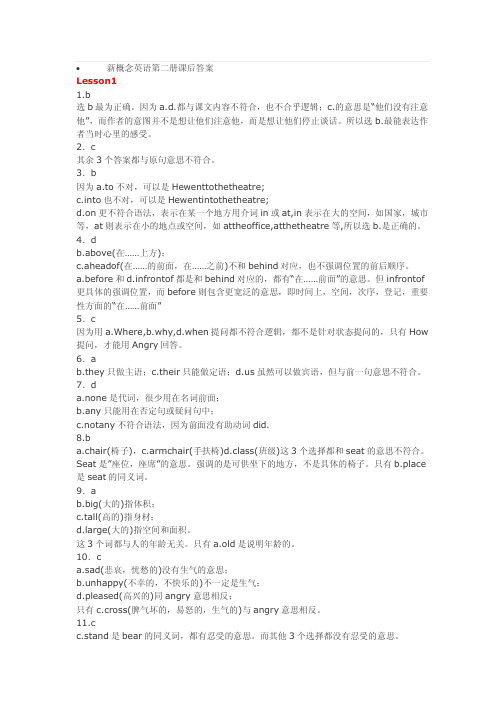
�新概念英语第二册课后答案L e s s o n11.b选b最为正确。
因为a.d.都与课文内容不符合�也不合乎逻辑�c.的意思是“他们没有注意他”�而作者的意图并不是想让他们注意他�而是想让他们停止谈话。
所以选b.最能表达作者当时心里的感受。
2�c其余3个答案都与原句意思不符合。
3�b因为a.t o不对�可以是H e w e n t t o t h e t h e a t r e;c.i n t o也不对�可以是H e w e n t i n t o t h e t h e a t r e;d.o n更不符合语法�表示在某一个地方用介词i n或a t,i n表示在大的空间�如国家�城市等�a t则表示在小的地点或空间�如a t t h e o f f i c e,a t t h e t h e a t r e等,所以选b.是正确的。
4�db.a b o v e(在……上方)�c.a h e a d o f(在……的前面�在……之前)不和b e h i n d对应�也不强调位置的前后顺序。
a.b e f o r e和d.i n f r o n t o f都是和b e h i n d对应的�都有“在……前面”的意思。
但i n f r o n t o f 更具体的强调位置�而b e f o r e则包含更宽泛的意思�即时间上�空间�次序�登记�重要性方面的“在……前面”5�c因为用a.W h e r e,b.w h y,d.w h e n提问都不符合逻辑�都不是针对状态提问的�只有H o w 提问�才能用A n g r y回答。
6�ab.t h e y只做主语�c.t h e i r只能做定语�d.u s虽然可以做宾语�但与前一句意思不符合。
7�da.n o n e是代词�很少用在名词前面�b.a n y只能用在否定句或疑问句中�c.n o t a n y不符合语法�因为前面没有助动词d id.8.ba.c h a i r(椅子)�c.a r m c h a i r(手扶椅)d.c l a s s(班级)这3个选择都和s e a t的意思不符合。
新概念英语2课后题答案(选择、填空)
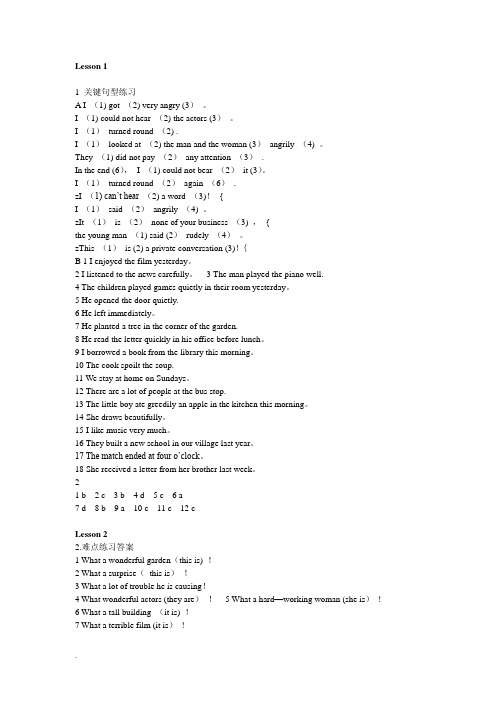
Lesson 11 关键句型练习A I (1) got (2) very angry (3)。
I (1) could not hear (2) the actors (3)。
I (1)turned round (2) .I (1)looked at (2) the man and the woman (3)angrily (4) 。
They (1) did not pay (2)any attention (3).In the end (6),I (1) could not bear (2)it (3)。
I (1)turned round (2)again (6).zI (1) can’t hear (2) a word (3)!{I (1)said (2)angrily (4) 。
zIt (1)is (2)none of your business (3) ,{the young man (1) said (2)rudely (4)。
zThis (1)is (2) a private conversation (3)!{B 1 I enjoyed the film yesterday。
2 I listened to the news carefully。
3 The man played the piano well.4 The children played games quietly in their room yesterday。
5 He opened the door quietly.6 He left immediately。
7 He planted a tree in the corner of the garden.8 He read the letter quickly in his office before lunch。
9 I borrowed a book from the library this morning。
新概念英语第二册课后习题答案详解

新概念英语第二册课后习题答案详解Lesson 1 1. b选b最为正确。
因为a. d.都与课文内容不符合,也不合乎逻辑;c.的意思是“他们没有注意他”,而作者的意图并不是想让他们注意他,而是想让他们停止谈话。
所以选b. 最能表达作者当时心里的感受。
2.c其余3个答案都与原句意思不符合。
3.b因为a. to 不对,可以是He went to the theatre;c. into 也不对,可以是He went into the theatre;d. on更不符合语法,表示在某一个地方用介词in 或at, in 表示在大的空间,如国家,城市等,at 则表示在小的地点或空间,如atthe office, at the theatre 等, 所以选b.是正确的。
4.db. above(在……上方);c. ahead of (在……的前面,在……之前)不和behind 对应,也不强调位置的前后顺序。
a. before 和 d. infront of 都是和behind对应的,都有“在……前面”的意思。
但in front of 更具体的强调位置,而before则包含更宽泛的意思,即时间上,空间,次序,登记,重要性方面的“在……前面”5.c因为用a. Where, b. why, d. when 提问都不符合逻辑,都不是针对状态提问的,只有How提问,才能用Angry回答。
6.ab. they 只做主语;c. their只能做定语;d. us 虽然可以做宾语,但与前一句意思不符合。
7.da. none是代词,很少用在名词前面;b. any 只能用在否定句或疑问句中;c. not any 不符合语法,因为前面没有助动词did. 8.ba. chair(椅子),c. armchair(手扶椅) d. class(班级) 这3个选择都和seat的意思不符合。
Seat是”座位,座席”的意思。
强调的是可供坐下的地方,不是具体的椅子。
新概念英语第二册课后答案

新概念英语第二册课后答案篇一: 新概念英语第二册课后练习lesson14新概念英语第二册课后习题答案详解Lesson 14练习答案Key to written exercises1. 关键句型练习答案A 1 I drove on to the next town after I had left a small village.2 I said good morning to him in French as soon as he had got into the car.3 I had nearly reached the town, when the young man said:‘Do you speak English?’C 1 After she had written the letter, she went to the post office.2 After he had had dinner, he went to the cinema.3 When I had fastened my seat belt, the plane took off.4 We did not disturb him until he had finished work.5 As soon as he had left the room, I turned on the radio.6 He had been very ill before he died.D 1 regretted2 had begun/ began3 arrived2. 难点练习答案1 Except for2 both of3 Apart from4 asked…ask for5 neither of…asked3. 多项选择题答案1.b按照课文第3行.stoppe.an.h.aske.m.fo..lift.只有b.h.wante..freerid.i.th.ca.最符合课文内容,而其他3个选择都与课文内容不符合。
(完整word版)新概念英语2课后题答案(选择、填空)

Lesson 11 关键句型练习A I (1) got (2) very angry (3)。
I (1) could not hear (2) the actors (3) .I (1) turned round (2)。
I (1) looked at (2) the man and the woman (3) angrily (4) .They (1) did not pay (2) any attention (3) .In the end (6), I (1) could not bear (2) it (3).I (1) turned round (2) again (6) .zI (1) can’t hear (2) a word (3)! {I (1) said (2) angrily (4) .zIt (1) is (2) none of your business (3) , {the young man (1) said (2) rudely (4) .zThis (1) is (2) a private conversation (3)!{B 1 I enjoyed the film yesterday。
2 I listened to the news carefully。
3 The man played the piano well.4 The children played games quietly in their room yesterday。
5 He opened the door quietly.6 He left immediately。
7 He planted a tree in the corner of the garden。
8 He read the letter quickly in his office before lunch。
9 I borrowed a book from the library this morning.10 The cook spoilt the soup。
新概念英语第二册课后答案详解汇总

新概念英语第二册课后答案详解汇总(经典版)编制人:__________________审核人:__________________审批人:__________________编制单位:__________________编制时间:____年____月____日序言下载提示:该文档是本店铺精心编制而成的,希望大家下载后,能够帮助大家解决实际问题。
文档下载后可定制修改,请根据实际需要进行调整和使用,谢谢!并且,本店铺为大家提供各种类型的经典范文,如工作报告、工作计划、活动方案、规章制度、演讲致辞、合同协议、条据文书、教学资料、作文大全、其他范文等等,想了解不同范文格式和写法,敬请关注!Download tips: This document is carefully compiled by this editor. I hope that after you download it, it can help you solve practical problems. The document can be customized and modified after downloading, please adjust and use it according to actual needs, thank you!Moreover, our store provides various types of classic sample essays, such as work reports, work plans, activity plans, rules and regulations, speeches, contract agreements, documentary evidence, teaching materials, complete essays, and other sample essays. If you would like to learn about different sample formats and writing methods, please pay attention!新概念英语第二册课后答案详解汇总本店铺今天给大家整理新概念英语第二册课后答案详解,一起来学习吧,下面本店铺就和大家分享,来欣赏一下吧。
新概念英语第二册课后习题答案详解及单元测试答案(全)
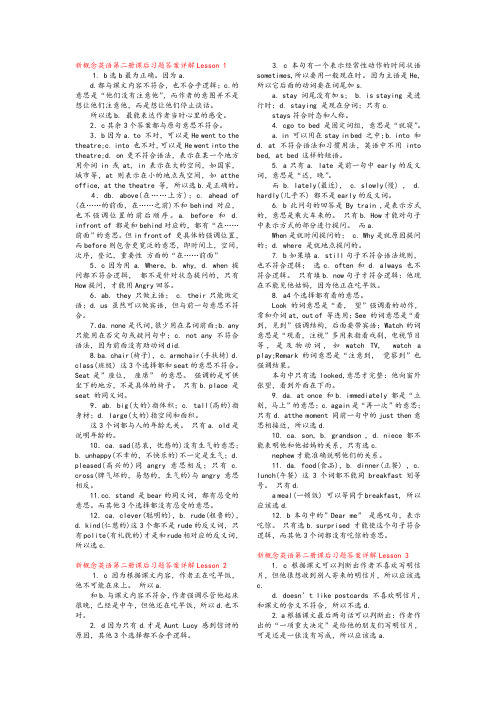
新概念英语第二册课后习题答案详解Lesson 11. b选b最为正确。
因为a.d.都与课文内容不符合,也不合乎逻辑;c.的意思是“他们没有注意他”,而作者的意图并不是想让他们注意他,而是想让他们停止谈话。
所以选b. 最能表达作者当时心里的感受。
2.c其余3个答案都与原句意思不符合。
3.b因为a. to 不对,可以是He went to the theatre;c. into 也不对,可以是He went into the theatre;d. on更不符合语法,表示在某一个地方用介词in 或at, in 表示在大的空间,如国家,城市等,at 则表示在小的地点或空间,如atthe office, at the theatre 等, 所以选b.是正确的。
4.db. above(在……上方);c. ahead of (在……的前面,在……之前)不和behind 对应,也不强调位置的前后顺序。
a. before 和 d. infront of 都是和behind对应的,都有“在……前面”的意思。
但in front of 更具体的强调位置,而before则包含更宽泛的意思,即时间上,空间,次序,登记,重要性方面的“在……前面”5.c因为用 a. Where, b. why, d. when 提问都不符合逻辑,都不是针对状态提问的,只有How提问,才能用Angry回答。
6.ab. they 只做主语; c. their只能做定语;d. us 虽然可以做宾语,但与前一句意思不符合。
7.da. none是代词,很少用在名词前面;b. any 只能用在否定句或疑问句中;c. not any 不符合语法,因为前面没有助动词did.8.ba. chair(椅子), c. armchair(手扶椅) d. class(班级) 这3个选择都和seat的意思不符合。
Seat是”座位,座席”的意思。
强调的是可供坐下的地方,不是具体的椅子。
新概念英语2课后题答案(选择、填空)
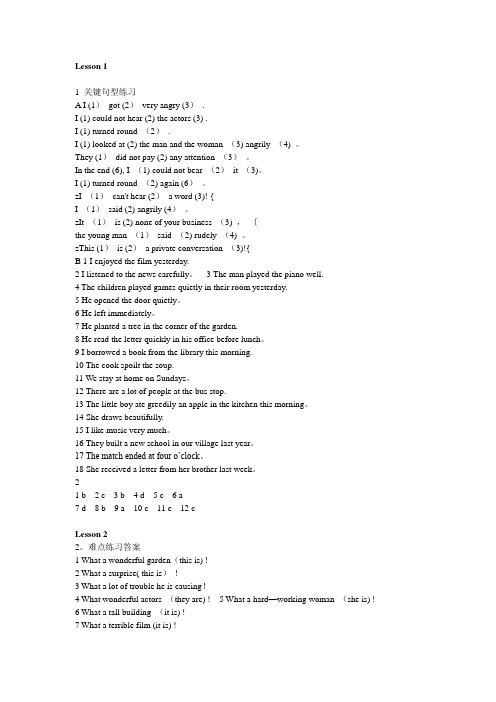
Lesson 11 关键句型练习A I (1)got (2)very angry (3).I (1) could not hear (2) the actors (3) .I (1) turned round (2).I (1) looked at (2) the man and the woman (3) angrily (4) 。
They (1)did not pay (2) any attention (3)。
In the end (6), I (1) could not bear (2)it (3)。
I (1) turned round (2) again (6)。
zI (1)can't hear (2)a word (3)! {I (1)said (2) angrily (4)。
zIt (1)is (2) none of your business (3) ,{the young man (1)said (2) rudely (4) 。
zThis (1)is (2)a private conversation (3)!{B 1 I enjoyed the film yesterday.2 I listened to the news carefully。
3 The man played the piano well.4 The children played games quietly in their room yesterday.5 He opened the door quietly。
6 He left immediately。
7 He planted a tree in the corner of the garden.8 He read the letter quickly in his office before lunch。
9 I borrowed a book from the library this morning.10 The cook spoilt the soup.11 We stay at home on Sundays。
新概念英语2课后选择题答案及详解

念英语第二册课后习题答案详解Lesson 1I. b选b最为正确。
因为a.d•都与课文内容不符合,也不合乎逻辑;c•的意思是“他们没有注意他”,而作者的意图并不是想让他们注意他,而是想让他们停止谈话。
所以选 b. 最能表达作者当时心里的感受。
2.c 其余3 个答案都与原句意思不符合。
3.b 因为a. to 不对,可以是He went to the theatre;c. into 也不对,可以是He went into the theatre;d. on 更不符合语法,表示在某一个地方用介词in 或at, in 表示在大的空间,如国家,城市等,at 则表示在小的地点或空间,如atthe office, at the theatre 等, 所以选b•是正确的。
4. db. above(在.. 上方);c. ahead of (在的前面,在之前)不和behind对应,也不强调位置的前后顺序。
a. before 和 d. infront of 都是和behind 对应的,都有“在. 前面”的意思。
但in front of更具体的强调位置,而before 则包含更宽泛的意思,即时间上,空间,次序,登记,重要性方面的“在 ...... 前面”5. c 因为用a. Where, b. why, d. when 提问都不符合逻辑,都不是针对状态提问的,只有How 提问,才能用Angry 回答。
6. ab. they 只做主语;c. their 只能做定语; d. us 虽然可以做宾语,但与前一句意思不符合。
7. da. none是代词,很少用在名词前面;b. any 只能用在否定句或疑问句中;c. not any 不符合语法,因为前面没有助动词did.8. ba. chair(椅子),c. armchair(手扶椅) d. class(班级)这3个选择都和seat的意思不符合。
Seat是”座位,座席”的意思。
新概念英语第二册课后习题答案详解(96课全)
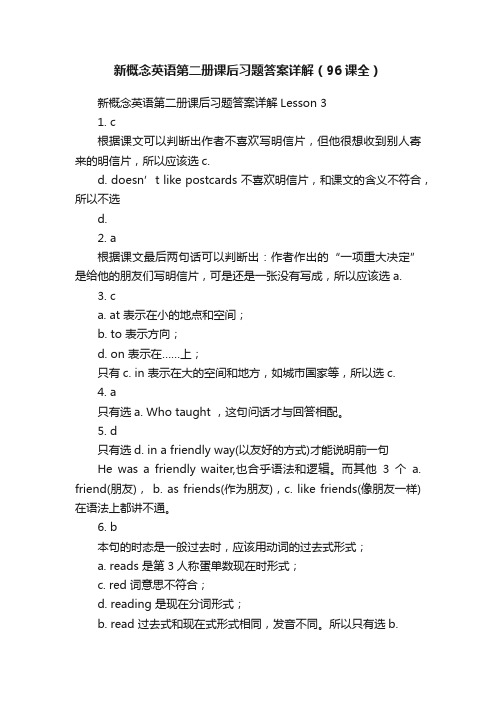
新概念英语第二册课后习题答案详解(96课全)新概念英语第二册课后习题答案详解Lesson 31. c根据课文可以判断出作者不喜欢写明信片,但他很想收到别人寄来的明信片,所以应该选c.d. doesn’t like postcards 不喜欢明信片,和课文的含义不符合,所以不选d.2. a根据课文最后两句话可以判断出:作者作出的“一项重大决定”是给他的朋友们写明信片,可是还是一张没有写成,所以应该选a.3. ca. at 表示在小的地点和空间;b. to 表示方向;d. on 表示在……上;只有c. in 表示在大的空间和地方,如城市国家等,所以选c.4. a只有选a. Who taught ,这句问话才与回答相配。
5. d只有选d. in a friendly way(以友好的方式)才能说明前一句He was a friendly waiter,也合乎语法和逻辑。
而其他3个a. friend(朋友), b. as friends(作为朋友),c. like friends(像朋友一样)在语法上都讲不通。
6. b本句的时态是一般过去时,应该用动词的过去式形式;a. reads 是第3人称蛋单数现在时形式;c. red 词意思不符合;d. reading 是现在分词形式;b. read 过去式和现在式形式相同,发音不同。
所以只有选b.7. ca. the hole 词意思不对;b. the ball 和 d. all of 不合乎习惯用法;英语中不用the all day, all of day 这样一来的短语。
只有选c. all 才能使句中的词组all day 同前一句中的the whole day 意思相同。
8. c句中的waiter 是“饭店服务员”的意思,他通常在饭店工作,而不在a. public garden(公园),b. shop(商店),d. private house(私宅) 工作,所以选c. restaurant.9. b只有b. borrowed 才与前一句中的lent相对应,而其他3个选择都不是。
新概念英语第二册课后习题答案详解_and_单元测试答案(全)(精心汇..
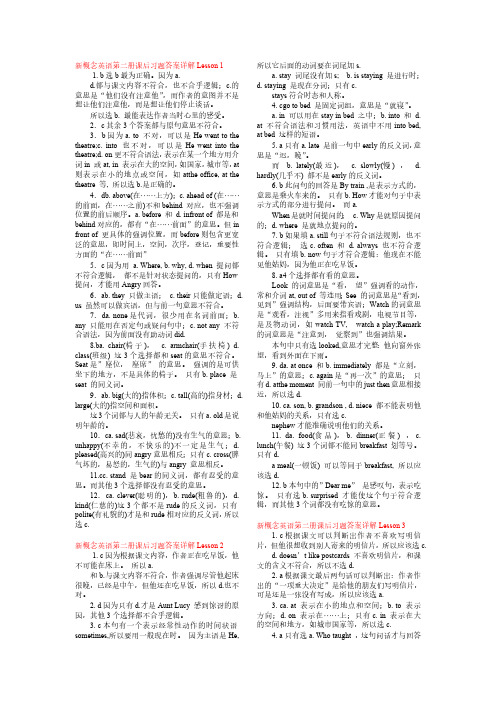
新概念英语第二册课后习题答案详解Lesson 11. b选b最为正确。
因为a. d.都与课文内容不符合,也不合乎逻辑;c.的意思是“他们没有注意他”,而作者的意图并不是想让他们注意他,而是想让他们停止谈话。
所以选b. 最能表达作者当时心里的感受。
2.c其余3个答案都与原句意思不符合。
3.b因为a. to 不对,可以是He went to the theatre;c. into 也不对,可以是He went into the theatre;d. on更不符合语法,表示在某一个地方用介词in 或at, in 表示在大的空间,如国家,城市等,at 则表示在小的地点或空间,如atthe office, at the theatre 等, 所以选b.是正确的。
4.db. above(在……上方);c. ahead of (在……的前面,在……之前)不和behind 对应,也不强调位置的前后顺序。
a. before 和 d. infront of 都是和behind对应的,都有“在……前面”的意思。
但in front of 更具体的强调位置,而before则包含更宽泛的意思,即时间上,空间,次序,登记,重要性方面的“在……前面” 5.c因为用 a. Where, b. why, d. when 提问都不符合逻辑,都不是针对状态提问的,只有How 提问,才能用Angry回答。
6.ab. they 只做主语;c. their只能做定语;d. us 虽然可以做宾语,但与前一句意思不符合。
7.da. none是代词,很少用在名词前面;b. any 只能用在否定句或疑问句中;c. not any 不符合语法,因为前面没有助动词did. 8.ba. chair(椅子), c. armchair(手扶椅) d. class(班级) 这3个选择都和seat的意思不符合。
Seat是”座位,座席”的意思。
强调的是可供坐下的地方,不是具体的椅子。
新概念英语第二册课后习题答案详解-and-单元测试答案(全)
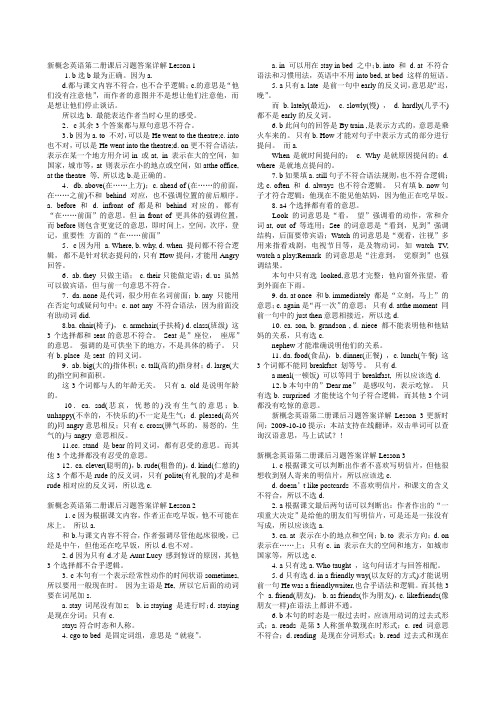
新概念英语第二册课后习题答案详解Lesson 11. b选b最为正确。
因为a.d.都与课文内容不符合,也不合乎逻辑;c.的意思是“他们没有注意他”,而作者的意图并不是想让他们注意他,而是想让他们停止谈话。
所以选b. 最能表达作者当时心里的感受。
2.c其余3个答案都与原句意思不符合。
3.b因为a. to 不对,可以是He went to the theatre;c. into 也不对,可以是He went into the theatre;d. on更不符合语法,表示在某一个地方用介词in 或at, in 表示在大的空间,如国家,城市等,at 则表示在小的地点或空间,如atthe office, at the theatre 等, 所以选b.是正确的。
4.db. above(在……上方);c. ahead of (在……的前面,在……之前)不和behind 对应,也不强调位置的前后顺序。
a. before 和 d. infront of 都是和behind对应的,都有“在……前面”的意思。
但in front of 更具体的强调位置,而before则包含更宽泛的意思,即时间上,空间,次序,登记,重要性方面的“在……前面”5.c因为用 a. Where, b. why, d. when 提问都不符合逻辑,都不是针对状态提问的,只有How提问,才能用Angry 回答。
6.ab. they 只做主语;c. their只能做定语;d. us 虽然可以做宾语,但与前一句意思不符合。
7.da. none是代词,很少用在名词前面;b. any 只能用在否定句或疑问句中;c. not any 不符合语法,因为前面没有助动词did.8.ba. chair(椅子),c. armchair(手扶椅) d. class(班级) 这3个选择都和seat的意思不符合。
Seat是”座位,座席”的意思。
强调的是可供坐下的地方,不是具体的椅子。
(完整版)新概念英语第二册课后习题答案详解
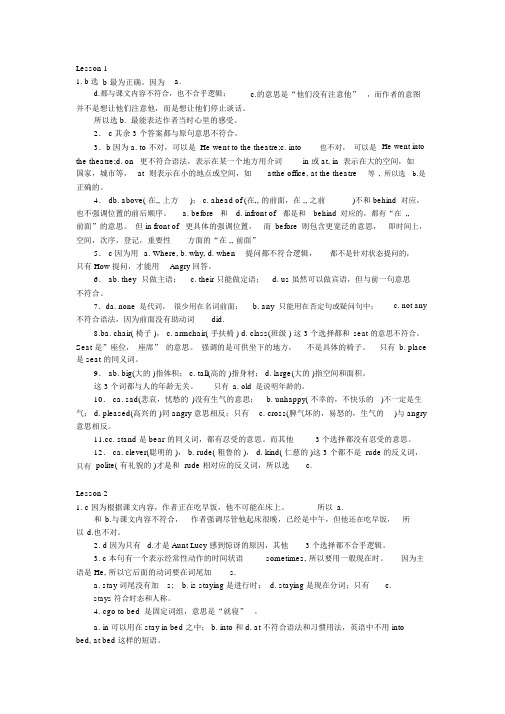
Lesson 11. b 选 b 最为正确。
因为 a.d.都与课文内容不符合,也不合乎逻辑; c.的意思是“他们没有注意他”,而作者的意图并不是想让他们注意他,而是想让他们停止谈话。
所以选 b. 最能表达作者当时心里的感受。
2. c 其余 3 个答案都与原句意思不符合。
3.b 因为 a. to 不对,可以是 He went to the theatre;c. into也不对,可以是He went into the theatre;d. on更不符合语法,表示在某一个地方用介词in 或 at, in 表示在大的空间,如国家,城市等,at 则表示在小的地点或空间,如atthe office, at the theatre等,所以选 b.是正确的。
4. db. above( 在,, 上方); c. ahead of (在,, 的前面,在 ,, 之前)不和 behind 对应,也不强调位置的前后顺序。
a. before和 d. infront of都是和behind对应的,都有“在,,前面”的意思。
但 in front of更具体的强调位置,而before则包含更宽泛的意思,即时间上,空间,次序,登记,重要性方面的“在 ,, 前面”5. c 因为用 a. Where, b. why, d. when提问都不符合逻辑,都不是针对状态提问的,只有 How 提问,才能用Angry 回答。
6. ab. they只做主语; c. their 只能做定语; d. us 虽然可以做宾语,但与前一句意思不符合。
7.da. none是代词,很少用在名词前面; b. any只能用在否定句或疑问句中; c. not any 不符合语法,因为前面没有助动词did.8.ba. chair( 椅子 ), c. armchair( 手扶椅 ) d. class(班级 ) 这 3 个选择都和seat 的意思不符合。
Seat 是”座位,座席” 的意思。
- 1、下载文档前请自行甄别文档内容的完整性,平台不提供额外的编辑、内容补充、找答案等附加服务。
- 2、"仅部分预览"的文档,不可在线预览部分如存在完整性等问题,可反馈申请退款(可完整预览的文档不适用该条件!)。
- 3、如文档侵犯您的权益,请联系客服反馈,我们会尽快为您处理(人工客服工作时间:9:00-18:30)。
念英语第二册课后习题答案详解Lesson 11. b选b最为正确。
因为a.d.都与课文内容不符合,也不合乎逻辑;c.的意思是“他们没有注意他”,而作者的意图并不是想让他们注意他,而是想让他们停止谈话。
所以选b. 最能表达作者当时心里的感受。
2.c其余3个答案都与原句意思不符合。
3.b因为a. to 不对,可以是He went to the theatre;c. into 也不对,可以是He went into the theatre;d. on更不符合语法,表示在某一个地方用介词in 或at, in 表示在大的空间,如国家,城市等,at 则表示在小的地点或空间,如atthe office, at the theatre 等, 所以选b.是正确的。
4.db. above(在……上方);c. ahead of (在……的前面,在……之前)不和behind 对应,也不强调位置的前后顺序。
a. before 和d. infront of 都是和behind对应的,都有“在……前面”的意思。
但in front of 更具体的强调位置,而before则包含更宽泛的意思,即时间上,空间,次序,登记,重要性方面的“在……前面”5.c因为用a. Where, b. why, d. when 提问都不符合逻辑,都不是针对状态提问的,只有How提问,才能用Angry回答。
6.ab. they 只做主语; c. their只能做定语;d. us 虽然可以做宾语,但与前一句意思不符合。
7.da. none是代词,很少用在名词前面;b. any 只能用在否定句或疑问句中;c. not any 不符合语法,因为前面没有助动词did.8.ba. chair(椅子), c. armchair(手扶椅)d. class(班级) 这3个选择都和seat的意思不符合。
Seat是”座位,座席”的意思。
强调的是可供坐下的地方,不是具体的椅子。
只有b. place 是seat 的同义词。
9.ab. big(大的)指体积;c. tall(高的)指身材;d. large(大的)指空间和面积。
这3个词都与人的年龄无关。
只有a. old是说明年龄的。
10.ca. sad(悲哀,忧愁的)没有生气的意思;b. unhappy(不幸的,不快乐的)不一定是生气;d. pleased(高兴的)同angry意思相反;只有c. cross(脾气坏的,易怒的,生气的)与angry 意思相反。
. stand 是bear的同义词,都有忍受的意思。
而其他3个选择都没有忍受的意思。
12.ca. clever(聪明的),b. rude(粗鲁的),d. kind(仁慈的)这3个都不是rude的反义词,只有polite(有礼貌的)才是和rude相对应的反义词,所以选c.新概念英语第二册课后习题答案详解Lesson 21. c因为根据课文内容,作者正在吃早饭,他不可能在床上。
所以a.和b.与课文内容不符合,作者强调尽管他起床很晚,已经是中午,但他还在吃早饭,所以d.也不对。
2. d因为只有d.才是Aunt Lucy 感到惊讶的原因,其他3个选择都不合乎逻辑。
3. c本句有一个表示经常性动作的时间状语sometimes,所以要用一般现在时。
因为主语是He, 所以它后面的动词要在词尾加s.a. stay 词尾没有加s;b. is staying 是进行时;d. staying 是现在分词;只有c.stays符合时态和人称。
4. cgo to bed 是固定词组,意思是“就寝”。
a. in 可以用在stay in bed 之中;b. into 和 d. at 不符合语法和习惯用法,英语中不用into bed, at bed 这样的短语。
5. a只有a. late 是前一句中early的反义词,意思是“迟,晚”。
而b. lately(最近),c. slowly(慢) ,d. hardly(几乎不) 都不是early的反义词。
6. b此问句的回答是By train ,是表示方式的,意思是乘火车来的。
只有b. How才能对句子中表示方式的部分进行提问。
而a.When是就时间提问的; c. Why是就原因提问的;d. where 是就地点提问的。
7. b如果填a. still句子不符合语法规则,也不符合逻辑;选c. often 和 d. always 也不符合逻辑。
只有填b. now句子才符合逻辑:他现在不能见他姑妈,因为他正在吃早饭。
8. a4个选择都有看的意思。
Look 的词意思是“看,望”强调看的动作,常和介词at, out of 等连用;See 的词意思是“看到,见到”强调结构,后面要带宾语;Watch的词意思是“观看,注视”多用来指看戏剧,电视节目等,是及物动词,如watch TV, watch a play;Remark 的词意思是“注意到,觉察到”也强调结果。
本句中只有选looked,意思才完整:他向窗外张望,看到外面在下雨。
9. da. at once 和b. immediately 都是“立刻,马上”的意思;c. again是“再一次”的意思;只有d. atthe moment 同前一句中的just then意思相接近,所以选d.10. ca. son, b. grandson , d. niece 都不能表明他和他姑妈的关系,只有选c.nephew才能准确说明他们的关系。
11. da. food(食品),b. dinner(正餐) ,c. lunch(午餐) 这3个词都不能同breakfast 划等号。
只有d.a meal(一顿饭) 可以等同于breakfast, 所以应该选d.12. b本句中的”Dear me”是感叹句,表示吃惊。
只有选b. surprised 才能使这个句子符合逻辑,而其他3个词都没有吃惊的意思。
新概念英语第二册课后习题答案详解Lesson 3更新时间:2009-10-10提示:本站支持在线翻译,双击单词可以查询汉语意思,马上试试?!新概念英语第二册课后习题答案详解Lesson 31. c根据课文可以判断出作者不喜欢写明信片,但他很想收到别人寄来的明信片,所以应该选c.d. doesn’t like postcards 不喜欢明信片,和课文的含义不符合,所以不选d.2. a根据课文最后两句话可以判断出:作者作出的“一项重大决定”是给他的朋友们写明信片,可是还是一张没有写成,所以应该选a.3. ca. at 表示在小的地点和空间;b. to 表示方向;d. on 表示在……上;只有c. in 表示在大的空间和地方,如城市国家等,所以选c.4. a只有选a. Who taught ,这句问话才与回答相配。
5. d只有选d. in a friendly way(以友好的方式)才能说明前一句He was a friendlywaiter,也合乎语法和逻辑。
而其他3个a. friend(朋友),b. as friends(作为朋友),c. likefriends(像朋友一样)在语法上都讲不通。
6. b本句的时态是一般过去时,应该用动词的过去式形式;a. reads 是第3人称蛋单数现在时形式;c. red 词意思不符合;d. reading 是现在分词形式;b. read 过去式和现在式形式相同,发音不同。
所以只有选b.7. ca. the hole 词意思不对;b. the ball 和d. all of 不合乎习惯用法;英语中不用the all day, all of day这样一来的短语。
只有选c. all 才能使句中的词组all day 同前一句中的the whole day 意思相同。
8. c句中的waiter 是“饭店服务员”的意思,他通常在饭店工作,而不在a. public garden(公园),b.shop(商店),d. private house(私宅) 工作,所以选c. restaurant.9. b只有b. borrowed 才与前一句中的lent相对应,而其他3个选择都不是。
英语中的borrow 和lend都有“借”的意思,但是borrow是“向……借”,而lend则是借给。
10. ab. end(最后,结束)有名词和动词词性,不能用在名词前修饰名词。
c. latest (最近的)不符合意思。
d. bottom(底部)是名词,不能修饰名词只有 a. final(最后的)才能使句子的意思成立。
11. b只有b. made up his mind(下决心)才同前一句中的made a big decision 意思相近。
而其他3个选择a. thought about it (考虑),c. changed his mind(改变主意),d. made awish(立下心愿)都没有下决心的意思。
12. b只有b. didn’t write even one(连一张也没有写)与前一句中的didn’t write a single card意思相同,而a. wrote only one, c. wrote just one, d. wrote all the cardsexcept one 都与其意思有别。
新概念英语第二册课后习题答案详解Lesson 41. d根据课文内容Tim is an engineer. He is working for a big firm..., 只有d. Timis working for a big firm as an engineer 是对的,其他3个与文章不符合。
2. b根据课文的最后一句My brother has never been abroadbefore…,应该选b.其他3个选择都与课文内容不符合。
3. ab. in(在……里面)不能和动词go连用;c. at(在……地方)也不能同go 连用;d.into(进入……内)可以与go连用,但是到某个国家不能用go into;只有a. to 同动词go 连用go to才能表示到某个地方去,如国家,城市等,所以选a.4. b本句是问“他在那儿呆了多久”。
因为说话时他还在那,所以应该用现在完成时态。
a. is he 是一般现在时;c. has he 中没有过去分词been, 不符合语法;d. was he 是一般过去时;只有b.has he been 是现在完成时, 所以选b.5. ba. for 只有同表示一段时间的词连用时候才能用在完成时中,如for six months, for one year等.c. from 常与介词to连用表示"从……到……",它很少用于现在完成时;d. by 可以表示时间“到……为止”,常用于过去完成时中和将来完成时中,但是它用在本句意思不对;只有b.since(从……以来)可以用在完成时态中,选b.才能使句子的时态和意思正确并且合乎逻辑。
